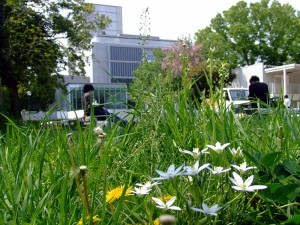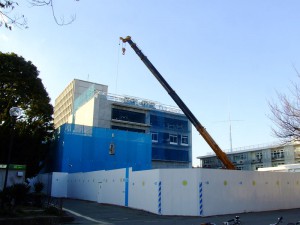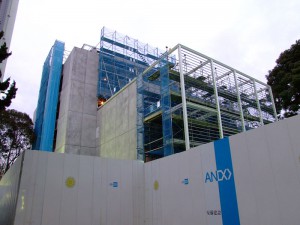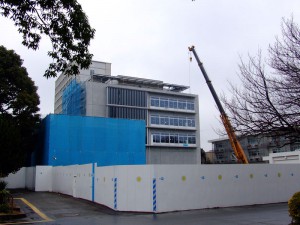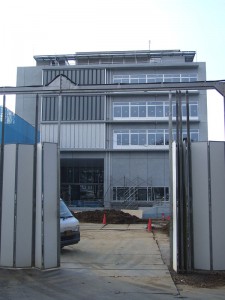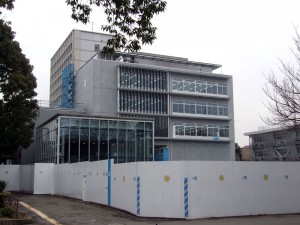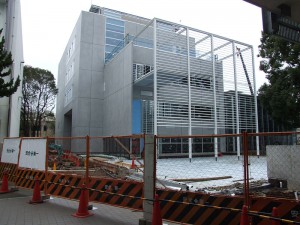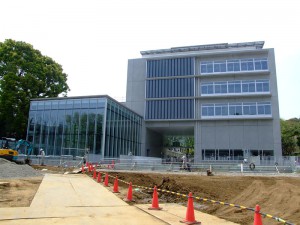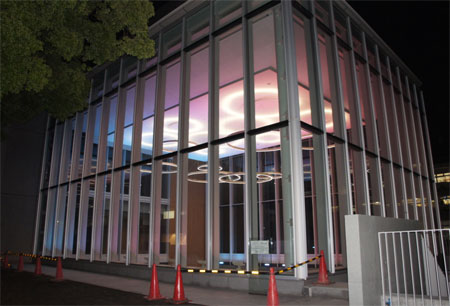 あの照明は一体何? ……その疑問は、こちらの記事を読んでいただくとして。
ここでは、あの照明にもエコな配慮がされていることをお伝えしましょう。
実はあの光、全てLED(発光ダイオード)照明になっています。
LEDは、近年では美術館から鍾乳洞まで、様々な場所に導入されています。
白熱電球よりも寿命が長いのに消費電力は少ない、環境に優しい照明。
実際に、白熱電球をLEDと取り替えるだけで、消費電力を半減できた所もあります。
理想の教育棟がZEBであることの、一つの象徴です。
あの照明は一体何? ……その疑問は、こちらの記事を読んでいただくとして。
ここでは、あの照明にもエコな配慮がされていることをお伝えしましょう。
実はあの光、全てLED(発光ダイオード)照明になっています。
LEDは、近年では美術館から鍾乳洞まで、様々な場所に導入されています。
白熱電球よりも寿命が長いのに消費電力は少ない、環境に優しい照明。
実際に、白熱電球をLEDと取り替えるだけで、消費電力を半減できた所もあります。
理想の教育棟がZEBであることの、一つの象徴です。
 もし夜に理想の教育棟の前を通るときは、光の美しさだけではなくて、
その背後にあるエコな視点にも、ぜひ思いを巡らせてみてくださいね。
(文:漆原)
もし夜に理想の教育棟の前を通るときは、光の美しさだけではなくて、
その背後にあるエコな視点にも、ぜひ思いを巡らせてみてくださいね。
(文:漆原) 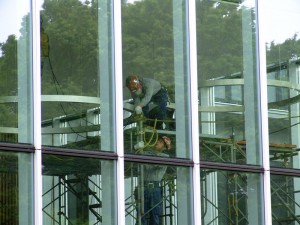 (5月9日撮影)
ここから点灯の様子をお伝えします。
全面ガラス張りのホール。美しい照明が目を引きます。
(5月9日撮影)
ここから点灯の様子をお伝えします。
全面ガラス張りのホール。美しい照明が目を引きます。
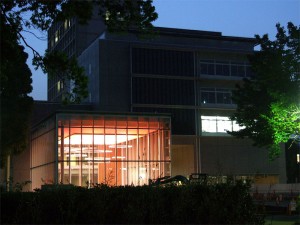 天井から吊るされた円形の照明に、側面から上方を照らすカラフルな照明が調和し、芸術的な趣を呈しています。
夕暮れのキャンパスで刻々と色の変化する様子に、多くの学生が足を留めて見上げていました。
天井から吊るされた円形の照明に、側面から上方を照らすカラフルな照明が調和し、芸術的な趣を呈しています。
夕暮れのキャンパスで刻々と色の変化する様子に、多くの学生が足を留めて見上げていました。
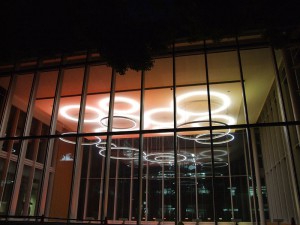 なお、「理想の教育棟」では、全館で省エネルギーの LED 照明が採用されています。
なお、「理想の教育棟」では、全館で省エネルギーの LED 照明が採用されています。
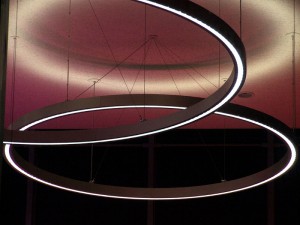 照明を含めた ZEB 技術については、本サイトのこちらをご参照下さい。
また、照明をデザインされた石井さんの特別インタビューも公開されています。ご一読をお勧めいたします。
照明を含めた ZEB 技術については、本サイトのこちらをご参照下さい。
また、照明をデザインされた石井さんの特別インタビューも公開されています。ご一読をお勧めいたします。
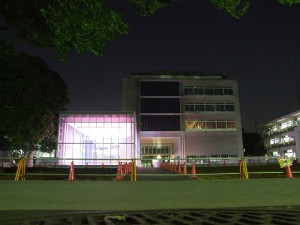 最後に、照明の変化する様子を動画で撮影しましたのでご覧下さい。
(音が出ます)
[youtube]http://www.youtube.com/watch?v=xKv62vEAFb0[/youtube]
(写真・文 刀根直樹)
最後に、照明の変化する様子を動画で撮影しましたのでご覧下さい。
(音が出ます)
[youtube]http://www.youtube.com/watch?v=xKv62vEAFb0[/youtube]
(写真・文 刀根直樹) 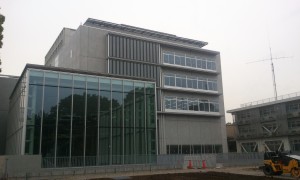 5月に入り、理想の教育棟の建物の工事が完成間近です。先週は工事用のフェンスが取り除かれて、日曜日には舗装工事が行われほぼ建物の外観は完成する予定です。その後は、電気設備などの内装工事が行われる予定です。
「理想の教育棟」という名前に注目されがちな建物ですが、その建築計画には東京大学駒場地区キャンパス計画に基づいて工事が実施されています。
■駒場地区キャンパス計画要綱によれば、駒場Ⅰキャンパス整備には4つの目標があります。
1.最先端の教育研究施設の整備
教育・研究の高度化に対応した最先端の施設・設備を擁する最適の大学キャンパスを実現する。
2.「開かれた大学」の理念の具体化
都市の一部としての大学の存在意義を認識し渋谷の文化ゾーンに隣接するという駒場Ⅰキャンパスの特性を活かして、学生・教職員の福利厚生を図りつつ、一般社会の文化的関心に大学として適切に応えるため、必要な整備を行う。
3.恵まれた自然環境の活用
武蔵野の面影を残す林、清涼な湧き水など恵まれた自然環境を最大限活用するとともに、この自然環境を基にして外部空間の骨格の整備を図る。
4.合理的更新システムの確立
アカデミック・プランの将来の発展に伴い必要となる施設計画の実現を可能とする建築面積の余裕を確保するとともに、教育研究活動を支障なく継続しつつ、必要に応じて絶えず施設の更新を可能とするシステムを確立する。
これらの目標がどのように実現されていくのか、大学に所属する人々が考えることが大切だと思います。
東京大学「キャンパス計画要綱」の施行について(平成22年10月1日)
http://www.u-tokyo.ac.jp/fac03/b07_02_j.html
(文と写真:林一雅)
5月に入り、理想の教育棟の建物の工事が完成間近です。先週は工事用のフェンスが取り除かれて、日曜日には舗装工事が行われほぼ建物の外観は完成する予定です。その後は、電気設備などの内装工事が行われる予定です。
「理想の教育棟」という名前に注目されがちな建物ですが、その建築計画には東京大学駒場地区キャンパス計画に基づいて工事が実施されています。
■駒場地区キャンパス計画要綱によれば、駒場Ⅰキャンパス整備には4つの目標があります。
1.最先端の教育研究施設の整備
教育・研究の高度化に対応した最先端の施設・設備を擁する最適の大学キャンパスを実現する。
2.「開かれた大学」の理念の具体化
都市の一部としての大学の存在意義を認識し渋谷の文化ゾーンに隣接するという駒場Ⅰキャンパスの特性を活かして、学生・教職員の福利厚生を図りつつ、一般社会の文化的関心に大学として適切に応えるため、必要な整備を行う。
3.恵まれた自然環境の活用
武蔵野の面影を残す林、清涼な湧き水など恵まれた自然環境を最大限活用するとともに、この自然環境を基にして外部空間の骨格の整備を図る。
4.合理的更新システムの確立
アカデミック・プランの将来の発展に伴い必要となる施設計画の実現を可能とする建築面積の余裕を確保するとともに、教育研究活動を支障なく継続しつつ、必要に応じて絶えず施設の更新を可能とするシステムを確立する。
これらの目標がどのように実現されていくのか、大学に所属する人々が考えることが大切だと思います。
東京大学「キャンパス計画要綱」の施行について(平成22年10月1日)
http://www.u-tokyo.ac.jp/fac03/b07_02_j.html
(文と写真:林一雅) After watching ‘Waltz with Bashir’ – the meaning of Memory
This is the animated documentary into the horrors of the 1982 Lebanon War, based on the director Ari Folman him self’s experience and the interviews from his old friends and comrades. The story begins with the scene of 26 vicious dogs chasing Ari’s one old friend. They conclude it has a connection to their Israeli Army mission invading Palestine. But unlike Ari’s friend who remembers what had happened and haunted by guilt, Ari cannot remember a thing, and he decides to meet his old friends and comrades, delving into the memory he has forgotten. Throughout the film, Ari finally gets to recall what had happened and what he had done at the Sabra and Shatila refugee camps. So why was Ari so desperate about delving into his erased memory, maybe knowing it would be a painful one? Why was it so important to him and what is he trying to say through this film? Being curious about these, I came to rethink about the meaning of ‘MEMORY’: What does memory mean to us who has not experienced the war or massacre, and what does it mean to the people who have suffered? Why do we need to remember the pains that may even seem irrelative to us and how do we need to deal with that memory? WAR is something like a MOVIE. In the film, there is a scene people watching the battlefield with bullets flying over and people dying out, just like the audience watching a movie. When we watch a movie, the way we interpret that movie or the most impressive scene differs depending on people. Just like that, the war is remembered in his or her own different way. Some would forget eventually, some would remember only the part they want to remember, and some would live with the distorted memory. Therefore, even though what people remember, the images they have about the battleground may be a fact, but we cannot determine it is the ‘truth’. Still, I do believe memory is something actually matters and something we should remember and share because there is something we should NOT forget in any case, the PAIN. Anyone who is related to the war or massacre lives every day with torment. Sometimes it is too painful to live with it, so they forget or intentionally erase those happenings. It may be just one page of the history book to the people without experience, but it is a REALITY to them and it is still going on. The tragedy someone might have felt, the pain someone might have borne, and the loss someone might have gone through. These are something that should not be faded away and something that we should not try to erase. So, what does memory mean to us without experience? Why is it important to us? I believe it is because the memory leads us to the place where we should be. When we do not have any memory, we fill those empty spaces with a vision, but when that space is filled with facts, the stories of people suffered of suffering, we finally get to know what it was like and how cruel people can get. Therefore, memory is the point where we can try to share the tragedy and sympathize, the point we think over our history, and the point we promise ourselves that we should not repeat the same mistake ever again. And why is it important to people with experience? The process of delving into the memory is painful and making them recall those times again might raise some ethical problems. Thus, I don’t blame people who erased their memories or people who don’t want to talk about it anymore, but I do believe, people can feel catharsis by sharing their torment together, and it can be a way to heal their pains. At some point in their lives, they may run into the situation that reminds them of the battlefield, or the moment memory haunting them back. At that point, I just want them to know that they are not alone. There are people with same or similar experience out there in the world, and people who are willing to understand their pain and trying to share it with them. Including us, no one can change what already happened in the past. But we CAN change the future. The future is ours and we are responsible for making world without war, world with peace. When we do not look back our past, we are tend to make the same mistakes, so not to go over the same tragedy, we should learn from the past and memory, and this would be the reason why Ari was so desperate to get his lost memories back.Hello! I’m Ryosei.
Let me make a summary here of this week’s activities.
First , we parted into six groups to analyze the following materials(*) and shared reports on how voices of hibakusya (victims of atomic bombs in Hiroshima and Nagasaki) are broadcasted in Japan.
(*)
①Hiroshima Peace Memorial Museum (text and video): http://www.pcf.city.hiroshima.jp/frame/Virtual_e/visit_e/westTestimo.html ②Nagasaki Atomic Bomb Museum (text): http://www1.city.nagasaki.nagasaki.jp/peace/english/survivors/index.html ③National Peace Memorial Halls for the Atomic Bomb Victims of Hiroshima and Nagasaki (text, audio and video): http://www.global-peace.go.jp/en/ ④Asahi Newspaper (text – currently call for translation volunteers): http://www.asahi.com/hibakusha/e/ ⑤Chugoku Newspaper (video): http://www.hiroshimapeacemedia.jp/mediacenter/staticpages/index.php?page=20100602155730428_en
This comparison gave us insight into how we can (and should) tell their testimony to others.
At the same time we tried to define and make it clear that for what we are learning ‘war , memories and remembering’ , and to whom we should appeal.
Before answering this , we have to question ourselves about ‘ Who are we? ‘ ‘ To what kind of generation are we belonged in the context of history? ‘
As you know hibakusya are getting older and the number of them is decreasing at a faster pace. So maybe we are in the last generation that can be shared the same time with them. I think this is the central point and the most important premise we should keep in mind.
Time is limited but there are piles of issues and attempts to discuss and consider. We are now tackling and struggling with them together , and i’m sure we will have done a good job finally.
Thank you for reading !

